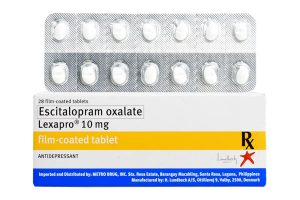If you’re looking to manage your mental health problems like depression and anxiety, your doctor may prescribe Wellbutrin to manage your condition. Wellbutrin is a popular antidepressant recommended for treating seasonal affective disorder and major depressive disorder. Sometimes, Wellbutrin is also prescribed as a cessation aid for people who want to quit smoking.
This article is a wholesome guide on using Wellbutrin for anxiety, the recommended dosages, precautions, drug interaction, and more. Read on to learn everything you need to know about using this antidepressant for anxiety.
Wellbutrin as an antidepressant
Wellbutrin is an antidepressant normally recommended to treat mood disorders such as seasonal affective disorder and major depressive disorder. Wellbutrin is a brand-name medication, and its generic name is bupropion.
Even though this medication is usually recommended for mood disorders, healthcare experts typically recommend it for other conditions, such as anxiety, attention deficit hyperactivity disorder, bipolar disorder, and smoking cessation.
Wellbutrin can be highly effective as an antidepressant and works by blockading the body’s reuptake of the dopamine and noradrenaline hormones, leaving them available and in the body for a more extended period.
By blocking the body’s reuptake of these hormones, Wellbutrin manages and balances their levels in the brain.
The continuous balance of the dopamine and noradrenaline hormones can be critical to a person’s mental well-being. Noradrenaline is associated with feelings of joy and boosting the body’s energy level.
In addition, dopamine is associated with mood, excitement, and motivation. Maintaining a healthy balance of these hormones in the brain is crucial for mental health.
Wellbutrin comes in an extended-release or immediate-release form that is taken orally. The extended-release form is called Wellbutrin XL, while the immediate-release form is Wellbutrin SR. Other bupropion brand-name alternatives include Forfivo XL and Aplenzin.
Wellbutrin for Anxiety
Even though Wellbutrin is essentially recommended to treat depression and mood disorders, this medication is effective for anxiety because of the way it works. Wellbutrin affects the levels of certain neurotransmitters, such as norepinephrine and serotonin, in the brain. These hormones are critical in regulating mood and behavior in the body.
Despite its effectiveness, Wellbutrin is not the typical first-line treatment for anxiety. It can, however, help ease anxiety symptoms and work effectively as part of an anxiety treatment plan.
Treating anxiety is generally considered an off-label use of Wellbutrin. This means the FDA has not officially approved using the medication to ease anxiety symptoms.
The full extent of Wellbutrin’s mechanism to cure anxiety has not been entirely understood. Patients must approach this medication cautiously to avoid complications during treatment. You must use the drug as instructed by your healthcare professional.
Some medical experts may recommend Wellbutrin for anxiety for some of the following reasons:
- Severe side effects of other drugs
- Tolerance of other anxiety drugs
- Duration of treatment
- Insufficient response from other drugs
Doctors typically recommend Wellbutrin for the following specific anxiety disorders:
- Social anxiety disorder
- Panic disorder
- Generalized anxiety disorder
- Obsessive-compulsive disorder
- Phobias
How Wellbutrin works for anxiety
Even though Wellbutrin belongs to a class of drugs called norepinephrine and dopamine reuptake inhibitors (NDRIs), it works just like selective serotonin reuptake inhibitors to reduce the symptoms of anxiety.
However, the course of action for both classes is different. SSRIs typically block serotonin reuptake so it can remain in the body for more prolonged activity. In contrast, Wellbutrin (NDRI) blocks norepinephrine and dopamine reuptake to extend their actions in the brain.
Wellbutrin’s primary work is to balance norepinephrine and dopamine neurotransmitters in the brain. This balance can help influence emotions, anxiety, mood, and behavior and generally improve a patient’s symptoms.
As with most medications, Wellbutrin may cause some side effects even while easing your symptoms and making you feel better.
These side effects usually appear in the first couple of days after starting the initial dosage and can vary from person to person.
Some people may experience fatigue, drowsiness, nausea, body pains, or sleeping problems when using Wellbutrin.

How long does Wellbutrin take to ease anxiety?
Typically, the time it takes for Wellbutrin to start working for anxiety depends on the type of anxiety and how effective the antidepressant is.
Some people may start seeing the medication’s effects after 6-8 weeks of antidepressant use. However, the timeline for patients to feel better on Wellbutrin varies from person to person.
In the first two weeks of starting Wellbutrin, patients may notice improved sleeping patterns, appetite boost, and increased body energy levels. These signs usually indicate that the medication is working as expected.
In addition, other telltale signs of anxiety may take up to 6-8 weeks to wholly improve.
It is vital to note that even though Wellbutrin is recommended for anxiety, the medication can still cause anxiety as a side effect after usage.
Anxiety can be one of the side effects of bupropion, and some patients can feel it worse immediately after treatment starts.
However, when used with some conditions and for specific individuals, Wellbutrin can be highly effective at treating anxiety.
Read Also: Wellbutrin and Alcohol: Can You Drink on Wellbutrin?
Considerations and precautions
Wellbutrin is considered effective in treating anxiety and typically has mild side effects on people. However, the drug can severely affect some people with specific risk factors.
For example, using Wellbutrin during pregnancy may increase the possibility of miscarriage or preterm labor in women. Infants can also be exposed to the drug through breastfeeding, which can harm the baby’s health.
In addition, people who drink large amounts of alcohol are also susceptible to increased symptoms of anxiety. Patients should only use Wellbutrin as recommended by a qualified healthcare professional.
It is important to note that suddenly discontinuing Wellbutrin use without proper guidance from a medical expert may lead to withdrawal symptoms that may be severe.
Using Wellbutrin with NSAID drugs increases a patient’s risk of excessive bleeding. Patients must discuss this with their doctors or healthcare expert before using this medication with other substances.
This will help your doctor understand how to address the safety concerns of using Wellbutrin and mitigate its harmful interactions with other drugs.
You must inform your doctor if you’ve taken any of the following:
- Monoamine oxidase inhibitors (MAOIs)
- Anxiety medications
- Depression medications
- Alcohol
- Non-steroidal anti-inflammatory drugs (NSAIDs)
- Migraine medications
- Benzodiazepines
- Blood thinners
- Water pills
- St. John’s Wort
- Medications for gastric acid
How to use Wellbutrin for anxiety
Wellbutrin comes in tablets to be ingested orally and is available in different forms. The forms include the following:
- Extended-release (XL)
- Immediate release (IR)
- Sustained-release (SR)
- Capsule
- Tablet
It is generally recommended to use this antidepressant in the morning because it can cause insomnia if ingested hours before bedtime.
The tablets or capsules mustn’t be crushed if you are using the extended-release form of the drug, chewed, or broken. The pill must be swallowed whole, preferably with a glass of water.
Wellbutrin XL is designed to release the effects of the medication slowly over time, which helps maintain a steady level of the drug in the body.
Altering the shape of the drug or crushing it before use can distort its absorption leading to a possible overdose or underdose, rendering the treatment ineffective.
This medication should only be used as specified by a qualified medical professional to avoid unwanted complications and health issues.
Wellbutrin for anxiety dosage
When using Wellbutrin for anxiety, a qualified doctor or healthcare professional must prescribe the required dosage. The dosage and nature of the anxiety being treated differ from person to person. Your doctor will consider your age, weight, and type of anxiety before recommending a specific dosage for your treatment.
The dosage recommended for anxiety treatment in adults varies from the dosage for children and teenagers. Similarly, the nature of the anxiety being treated, as well as the duration of treatment, can affect the dosage.
The typically recommended starting dose is 150mg once every day. However, the dosage can be increased up to 3 times that.
Usually, your doctor may put you on a smaller dose to gauge how effective the antidepressant is against your symptoms before stepping up to a higher amount.
Side effects of using Wellbutrin
Similar to other antidepressants, Wellbutrin may cause some common side effects that may not require immediate specialist medical attention.
The side effects of this medication usually occur when the body is trying to get used to the drug and can be mild to nonexistent. Some of these mild side effects are:
- Headache
- Body pains
- Nausea
- Vomiting
- Nervousness
- Dry mouth
- Constipation
- Excessive sweating
- Tremors
- Weight loss
Sometimes, the side effects may be more severe than usual, requiring immediate medical attention. Several factors can influence how severe the side effects of Wellbutrin are.
These factors include age, genetics, existing health conditions, and possible drug interactions. Dietary supplements like St. John’s Wort and alcohol can also cause severe side effects.
Some of the severe side effects may include:
- Suicidal thoughts
- Seizures
- Insomnia
- Irritability
- Hypertension
- Increased anxiety or depression
- Cardiac irregularities
- Angle-closure glaucoma
- Hyperventilation
- Manic episodes
- Panic attacks
Read Also: All You Need to Know About Wellbutrin Withdrawal Symptoms
Frequently Asked Questions
One of the side effects of Wellbutrin is anxiety. Wellbutrin can cause anxiety in some groups of people when they first start taking the drug or increase their doses.
Sometimes, your healthcare professional may recommend moving to a lower amount to ease the severity of the side effects. You must only alter your Wellbutrin dosage as advised by your doctor.
Wellbutrin is an antidepressant known as bupropion and has proven to be quite effective in reducing the anxiety levels of people with anxiety disorders.
Using Wellbutrin to treat anxiety has some benefits. For instance, Wellbutrin typically doesn’t cause severe symptoms to occur.





